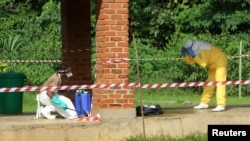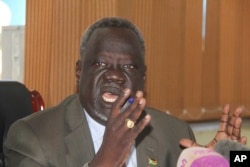The World Health Organization (WHO) says the outbreak of Ebola in the Democratic Republic of Congo has reached a city, raising fears of a wider spread of the deadly virus.
A new case was confirmed Thursday in Mbandaka, a city of more than one million people in the northwestern province of Equateur. Mbandaka is about 150 kilometers from the rural area of Bikoro, where the outbreak was detected earlier this month. Officials say more than 20 people have died in the DRC.
While Mbandaka is well over 1,000 kilometers from the Congo-South Sudan border, the WHO and South Sudanese health officials are taking no chances. They have placed surveillance measures along the country's border with the DRC, saying they will screen all travelers entering South Sudan.
South Sudan's health ministry and WHO officials say they are ready to counter any suspected Ebola outbreak in the country.
"Although there are no suspected Ebola cases reported in South Sudan yet, the Ministry of Health is on high alert in collaboration with WHO; the ministry has stepped up prevention and preparedness," Health Minister Doctor Riek Gai Kok told reporters Thursday in Juba.
Gai said his ministry is carrying out awareness campaigns to educate people about the dangers of Ebola and is ramping up surveillance. Officials have also positioned emergency kits in areas close to the DRC border so that health workers can quickly investigate any possible cases.
Dr. Evans Liyosi, the WHO representative in South Sudan, said the best way to protect against an Ebola outbreak is to educate family members and friends on how to detect suspected cases of the deadly virus.
Ebola is characterized by the sudden onset of high fever, along with extreme tiredness, headache, body pain and unexplained bleeding.
The disease is spread by contact with the bodily fluids of an infected person. People can also contract the virus by handling the body of a person who died of the disease.
"We are prepared to deal with any reported suspects, and people know how to report suspected [cases] if there is any," Liyosi said.
Although the Ebola virus has no cure, patients who are provided with early intensive treatment and care, especially fluid replacement therapy, and who are carefully monitored by trained health workers have a chance of recovery.
Officials in Congo are also offering an experimental vaccine that has been shown to fend off the virus.
The largest-ever Ebola outbreak killed more than 11,000 people in Guinea, Liberia and Sierra Leone in 2014 and 2015.





